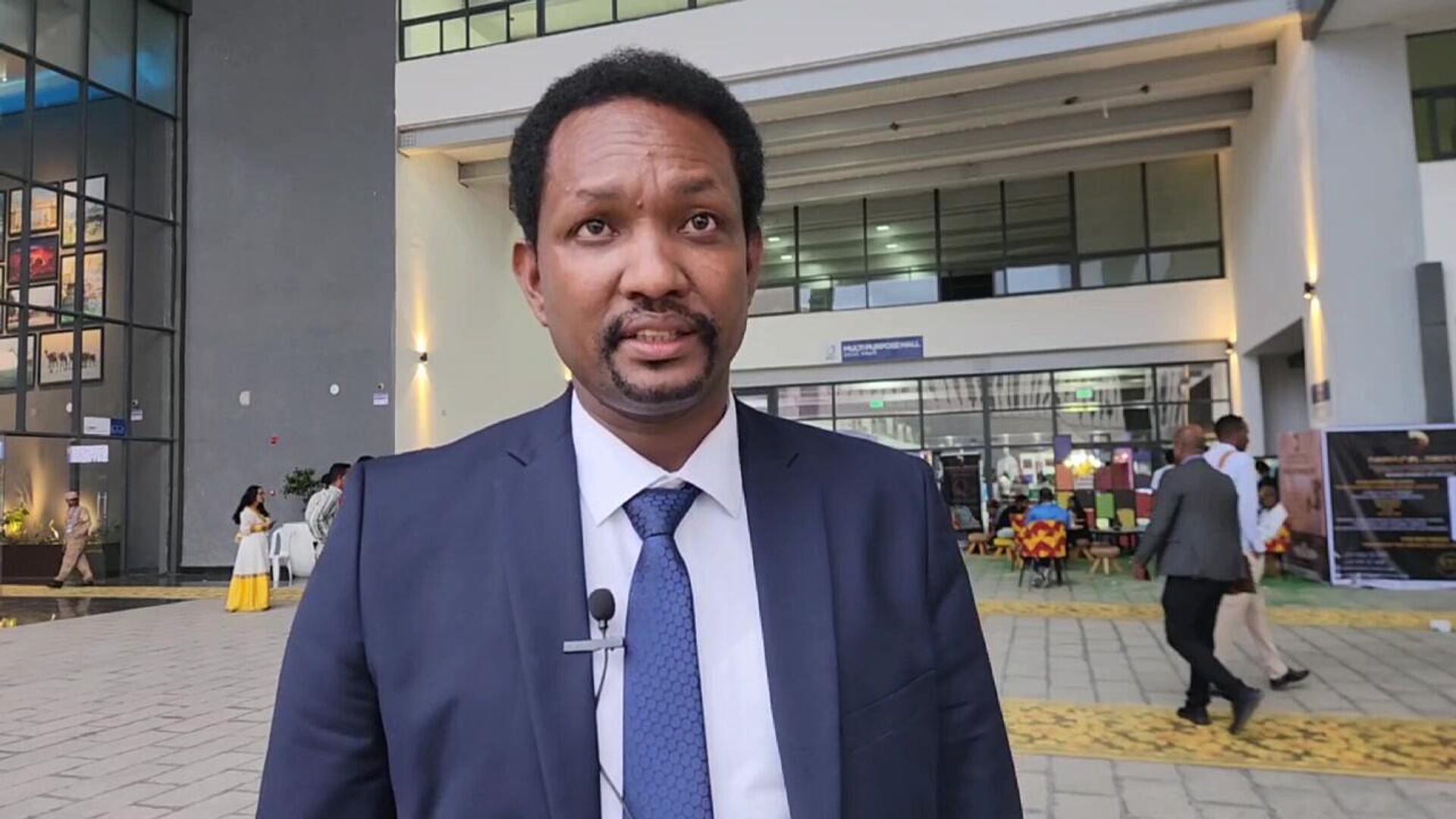https://en.sputniknews.africa/20250504/made-in-ethiopia-manufacturing-boom-drives-import-substitution-1072631138.html
'Made in Ethiopia': Manufacturing Boom Drives Import Substitution
'Made in Ethiopia': Manufacturing Boom Drives Import Substitution
Sputnik Africa
Addis Ababa hosts the third edition of the Made in Ethiopia expo, showcasing the latest advancements in industrial technology and serving as a platform to... 04.05.2025, Sputnik Africa
2025-05-04T16:21+0200
2025-05-04T16:21+0200
2025-05-04T18:18+0200
sub-saharan africa
africa in details
expo
exhibition
technology
ethiopia
addis ababa
east africa
industry
export
https://cdn1.img.sputniknews.africa/img/07e9/05/04/1072632174_0:0:1281:720_1920x0_80_0_0_1b94593dae7fcfd46ca346b5ca4abeac.jpg
The Made in Ethiopia expo 2025 advances the "Made in Ethiopia" initiative by fostering domestic production to reduce reliance on imported goods, Ethiopian Minister of State for Industry Tarekegn Bululta told Sputnik Africa on the sidelines of the event held in Addis Ababa on May 3-7.The Ethiopian government procurement policies prioritize locally made goods, incentivizing import substitution, he emphasized.This year, the exhibition showcases 288 Ethiopian manufacturing industries across seven sectors, namely metal, food, leather, pharmaceuticals, textiles, meat, and dairy, the speaker pointed out.Furthermore, the event features 17 startups, and the most creative will receive an award. Special recognition will be given to those excelling in import substitution, with women investors highlighted for their contributions, according to Tarekegn.Ethiopia Strengthens Ties with BRICS to Boost Trade and InvestmentEthiopia also sees potential to deepen ties with Russia for importing goods not produced domestically like fertilizers, vehicles, and machinery, the official pointed out. Ethiopia's manufacturing sector aims to earn foreign exchange through exports, which have grown by 18% in the last nine months.
ethiopia
addis ababa
east africa
russia
Sputnik Africa
feedback@sputniknews.com
+74956456601
MIA „Rossiya Segodnya“
2025
News
en_EN
Sputnik Africa
feedback@sputniknews.com
+74956456601
MIA „Rossiya Segodnya“
'Made in Ethiopia': Manufacturing Boom Drives Import Substitution
Sputnik Africa
'Made in Ethiopia': Manufacturing Boom Drives Import Substitution
2025-05-04T16:21+0200
true
PT1S
Ethiopia Strengthens Ties with BRICS to Boost Trade and Investment, Industry State Minister Says
Sputnik Africa
Ethiopia Strengthens Ties with BRICS to Boost Trade and Investment, Industry State Minister Says
2025-05-04T16:21+0200
true
PT1S
Sputnik Africa
feedback@sputniknews.com
+74956456601
MIA „Rossiya Segodnya“
africa in details, expo, exhibition , technology, ethiopia, addis ababa, east africa, industry, export, import, production, brics, trade, russia, cooperation, investment, видео
africa in details, expo, exhibition , technology, ethiopia, addis ababa, east africa, industry, export, import, production, brics, trade, russia, cooperation, investment, видео
'Made in Ethiopia': Manufacturing Boom Drives Import Substitution
16:21 04.05.2025 (Updated: 18:18 04.05.2025) Elizaveta Roschina
Writer/Editor
Longread
Addis Ababa hosts the third edition of the Made in Ethiopia expo, showcasing the latest advancements in industrial technology and serving as a platform to strengthen the country's manufacturing sector.
The Made in Ethiopia expo 2025 advances the "Made in Ethiopia" initiative by fostering domestic production to reduce reliance on imported goods, Ethiopian Minister of State for Industry Tarekegn Bululta told Sputnik Africa on the sidelines of the event held in Addis Ababa on May 3-7.
"For example, in the last nine months alone, we have started to substitute about $3.1 billion in the country. We have identified about 96 products in the strategy, some of which we will replace in the short term, some in the medium term, and some in the long term. The results we have achieved in import substitution production in particular are very encouraging," the official noted.
The Ethiopian government procurement policies prioritize locally made goods, incentivizing import substitution, he emphasized.
"This result was recorded because the government also carried out procurement. The government has given priority to products produced in the country. When government institutions make procurements, they give priority to products that are domestically produced. This is acting as an incentive for manufacturers to produce substitute products," the minister of state explained.
This year, the exhibition showcases 288 Ethiopian manufacturing industries across seven sectors, namely metal, food, leather, pharmaceuticals, textiles, meat, and dairy, the speaker pointed out.
"The aim is to create market linkages, industries will be connected to each other in the market, the public will see their products, buy them, so one of the aims is to create market linkages," he said.
Furthermore, the event features 17 startups, and the most creative will receive an award. Special recognition will be given to those excelling in import substitution, with women investors highlighted for their contributions, according to Tarekegn.
Ethiopia Strengthens Ties with BRICS to Boost Trade and Investment
"In terms of BRICS, domestic investment is growing, especially our relationship with Russia is growing in terms of investment and exports," the minister of state noted.
Ethiopia also sees potential to deepen ties with Russia for importing goods not produced domestically like fertilizers, vehicles, and machinery, the official pointed out.
"We are working as a center for better market opportunities and connections with the BRICS countries," he emphasized.
Ethiopia's manufacturing sector aims to earn foreign exchange through exports, which have grown by 18% in the last nine months.

